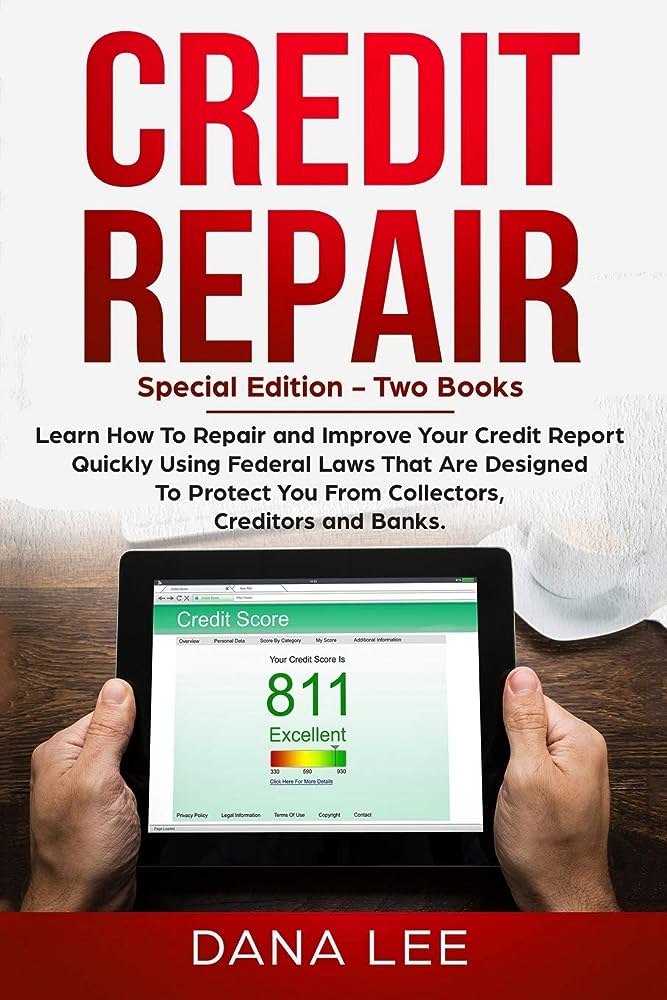In the realm of personal finance, maintaining good credit is paramount. However, navigating the complexities of credit repair can be both daunting and confusing. This article aims to provide clarity and guidance by presenting a curated list of the best books on credit repair. These distinguished literary works offer invaluable insights, strategies, and practical tips to help individuals regain control over their credit history. From step-by-step instructions to in-depth analyses of credit reporting systems, these books equip readers with the knowledge necessary to rebuild their creditworthiness and achieve financial freedom.
Credit Repair Basics
Credit repair is a crucial subject for individuals striving to improve their financial standing. Understanding the basics of credit repair is essential in order to effectively navigate the process of repairing and boosting credit scores. One fundamental aspect is comprehending credit scores and their significance in the financial world.
Understanding Credit Scores
Credit scores serve as a numerical representation of an individual’s creditworthiness. Lenders and creditors use credit scores to assess the risk involved in extending credit to a particular individual. These scores are determined based on several factors, including payment history, credit utilization ratio, length of credit history, types of credit used, and new credit inquiries. Understanding how credit scores are calculated and the factors that influence them is crucial in developing a strategy for credit repair.
Common Credit Mistakes
Many individuals make common credit mistakes, which can have a detrimental impact on their credit scores. These mistakes include late payments, maxing out credit cards, applying for multiple credit accounts simultaneously, and closing credit accounts without considering the potential negative effects. It is imperative to identify and avoid these mistakes in order to improve credit scores and overall financial wellness.
Importance of Credit Reports
Credit reports provide detailed information regarding an individual’s credit history and current credit status. They include information about loans, credit card accounts, payment history, and public records such as bankruptcies and liens. Credit reports serve as the foundation for credit scores and play a significant role in credit repair. Understanding the information contained in credit reports and regularly monitoring their contents is crucial in identifying errors or discrepancies that can negatively impact credit scores.
Financial Education and Money Management
Acquiring financial education and developing effective money management skills are key components of credit repair. By gaining knowledge about personal finance and adopting strategies for proper money management, individuals can significantly improve their financial situation.
Effective Budgeting Strategies
Budgeting is a fundamental aspect of money management. Implementing effective budgeting strategies helps individuals allocate their income towards essential expenses, debt repayments, and savings. Creating a comprehensive monthly budget, analyzing spending patterns, and identifying areas where expenses can be reduced are all crucial steps in managing personal finances and ultimately repairing credit.
Debt Management Techniques
Debt management is an essential skill for individuals aiming to repair their credit. Understanding how to effectively manage and reduce debt can significantly improve credit scores. Techniques such as debt prioritization, debt consolidation, and negotiating repayment plans with creditors can all contribute to successfully managing and reducing debt.
Building Good Financial Habits
Building good financial habits is a lifelong practice that contributes to overall financial health. These habits include consistently making payments on time, maintaining a low credit utilization ratio, regularly monitoring credit reports, and avoiding unnecessary debt. By developing and maintaining good financial habits, individuals can steadily rebuild their credit and establish a solid foundation for future financial success.

This image is property of Amazon.com.
Credit Repair Strategies
Once individuals have a solid understanding of credit scores, have corrected any common credit mistakes, and have developed good financial habits, they can begin implementing specific credit repair strategies to further improve their credit standing.
Disputing Errors on Credit Reports
One effective credit repair strategy involves identifying and disputing errors on credit reports. Mistakes such as incorrect personal information, inaccurate account details, or fraudulent accounts can significantly impact credit scores. By thoroughly reviewing credit reports and submitting formal disputes to credit bureaus, individuals can request the removal or correction of such errors and subsequently see an improvement in their credit scores.
Negotiating with Creditors
Another credit repair strategy involves negotiating with creditors. Individuals facing financial challenges can often benefit from reaching out to their creditors to discuss potential modifications to repayment terms. These modifications may include reduced interest rates, extended payment plans, or even settlement agreements. Cooperating with creditors and demonstrating commitment to resolving outstanding debts can positively impact credit scores.
Dealing with Collection Agencies
Engaging with collection agencies can be an intimidating experience for individuals with past due debts. However, understanding one’s rights and effectively communicating with collection agencies is an essential credit repair strategy. By requesting written documentation of debts, verifying their legitimacy, and negotiating repayment options, individuals can navigate the collection process and work towards resolving outstanding debts.
Credit Counseling and Credit Repair Services
For individuals seeking professional guidance and expertise in the credit repair process, credit counseling and credit repair services can be valuable resources.
Benefits of Credit Counseling
Credit counseling provides individuals with expert advice and guidance on various facets of credit repair. Counseling agencies can offer personalized financial assessments, assistance in developing effective debt management plans, and educational resources on topics such as budgeting and credit building. Credit counseling can be a helpful step for individuals working towards credit repair.
Choosing a Reputable Credit Repair Service
When considering the use of a credit repair service, it is essential to choose a reputable and trustworthy provider. Researching and selecting a credit repair service with a proven track record of success and positive customer reviews is crucial. Reliable credit repair services can aid individuals in navigating the credit repair process and employ effective strategies to improve credit scores.
Navigating DIY Credit Repair
While professional credit repair services can be beneficial, some individuals may opt for a do-it-yourself (DIY) approach to credit repair. Navigating DIY credit repair involves thoroughly educating oneself on credit repair strategies, disputing errors, negotiating with creditors, and building positive credit habits. While this route requires significant time and effort, it can be a cost-effective option for individuals who prefer a more hands-on approach.

This image is property of Amazon.com.
Credit Repair Legalities and Regulations
To ensure credit repair is conducted ethically and within the boundaries of the law, it is essential to understand relevant legalities and regulations.
Understanding the Fair Credit Reporting Act (FCRA)
The Fair Credit Reporting Act (FCRA) establishes guidelines for credit reporting agencies and provides individuals with certain rights regarding their credit information. Understanding the provisions of the FCRA, including the right to request free credit reports, the right to dispute inaccuracies, and the statute of limitations on reporting certain negative information, is crucial for individuals engaged in credit repair.
Complying with the Fair Debt Collection Practices Act (FDCPA)
The Fair Debt Collection Practices Act (FDCPA) governs the actions of third-party debt collectors. It provides guidelines and restrictions on debt collection practices, ensuring fair treatment of individuals dealing with debt. By understanding the protections and limitations outlined in the FDCPA, individuals can protect themselves from unfair or abusive debt collection practices while working towards credit repair.
Other Applicable Laws and Regulations
In addition to the FCRA and the FDCPA, several other laws and regulations may impact credit repair processes. These include state-specific laws, such as statutes of limitations on debt collection, as well as federal regulations related to identity theft and consumer protections. Understanding and adhering to these applicable laws and regulations is essential for individuals engaged in credit repair.
Credit Repair Success Stories
Credit repair success stories can serve as a source of inspiration and motivation for individuals working towards improving their credit scores.
Personal Experiences with Credit Repair
Personal experiences with credit repair can provide valuable insights and strategies for others facing similar challenges. Individuals who have successfully repaired their credit can share their journey, including the steps they took, challenges they encountered, and the positive outcomes they achieved. Learning from these personal experiences can offer guidance and encouragement to those on their credit repair journey.
Case Studies of Successful Credit Repair
Case studies highlighting successful credit repair endeavors can be an excellent resource for individuals seeking specific strategies and techniques. These case studies often detail the individual’s starting credit situation, the unique challenges they faced, and the specific actions they took to improve their credit scores. Case studies demonstrate the potential for credit repair success and provide practical examples for others to follow.
Inspiring Stories of Credit Score Improvement
Stories of individuals who have significantly improved their credit scores can be incredibly inspiring. These stories often involve individuals overcoming significant financial hardships, diligently implementing credit repair strategies, and ultimately witnessing a substantial improvement in their credit standing. Such stories can motivate and empower individuals to continue their credit repair efforts.

This image is property of Amazon.com.
Recommended Credit Repair Books
Several highly regarded books on credit repair provide comprehensive insights and strategies for individuals seeking to improve their credit standing.
The Complete Guide to Credit Repair
“The Complete Guide to Credit Repair” offers a comprehensive overview of the credit repair process. It covers topics such as understanding credit reports, disputing errors, negotiating with creditors, and rebuilding credit. This book provides practical tips and advice to help individuals navigate the credit repair journey effectively.
Credit Repair Kit For Dummies
“Credit Repair Kit For Dummies” offers a user-friendly approach to credit repair. This book provides step-by-step instructions on disputing errors, negotiating with creditors, and building positive credit habits. It also includes helpful templates and forms to assist individuals in their credit repair efforts.
The Credit Repair Handbook
“The Credit Repair Handbook” offers a comprehensive guide to credit repair strategies and techniques. It covers topics such as disputing errors, dealing with collection agencies, and rebuilding credit. This book provides valuable insights and actionable advice for individuals seeking to improve their credit scores.
Credit Repair Books for Beginners
For individuals new to the concept of credit repair, several books provide excellent introductions to the subject.
Credit Repair 101
“Credit Repair 101” serves as an introductory guide to credit repair for beginners. It covers essential topics such as understanding credit scores, disputing errors, and developing positive financial habits. This book offers a beginner-friendly approach to credit repair strategies and provides a solid foundation for further learning.
The ABCs of Credit Repair
“The ABCs of Credit Repair” offers a simple and straightforward explanation of credit repair for beginners. It breaks down complex concepts into easily understandable terms and provides practical tips and advice for improving credit scores. This book is ideal for individuals looking for a beginner-level resource.
Credit Repair Made Easy
“Credit Repair Made Easy” provides an accessible approach to credit repair for beginners. It offers step-by-step instructions on disputing errors, building positive credit habits, and negotiating with creditors. This book is designed to simplify the credit repair process and guide individuals through the initial stages of repairing their credit.

This image is property of Amazon.com.
Advanced Credit Repair Techniques
For individuals who have already implemented the fundamentals of credit repair, advanced techniques can further enhance their credit repair efforts.
Mastering Credit Disputes
Mastering credit disputes involves refining the skill of identifying errors on credit reports and effectively challenging them. Advanced techniques for credit disputes include gathering comprehensive evidence, employing legal frameworks such as the FCRA, and leveraging negotiation tactics. By mastering credit disputes, individuals can effectively navigate the complexities of repairing credit.
Advanced Negotiation Strategies
Advanced negotiation strategies are particularly beneficial for individuals facing significant debts or challenging credit situations. These strategies involve understanding creditor motivations, negotiating favorable terms such as debt settlements or payment plans, and leveraging one’s financial strengths to secure beneficial outcomes. Advanced negotiation techniques can play a pivotal role in credit repair.
Legal Loopholes for Credit Repair
While credit repair primarily relies on ethical and lawful strategies, understanding legal loopholes can provide individuals with additional avenues for improving credit scores. These may include disputing certain types of negative information, taking advantage of legal protections, or leveraging specific credit laws to one’s advantage. Understanding and utilizing legal loopholes responsibly can boost credit repair efforts.
Credit Repair for Specific Situations
Credit repair strategies may vary depending on individual circumstances. Here, we explore credit repair tailored to specific situations.
Credit Repair for Students
Students often face unique credit challenges due to limited credit history and potential mistakes made as they navigate their financial independence. Credit repair strategies for students include establishing a positive credit history, managing student loan debt effectively, and avoiding common credit mistakes. By taking proactive steps towards responsible credit management, students can lay the groundwork for a strong credit future.
Credit Repair for Entrepreneurs
Entrepreneurs face specific credit challenges, particularly when starting or scaling a business. Credit repair strategies for entrepreneurs include separating personal and business credit, monitoring credit for fraudulent activity, managing debt obligations, and developing a solid financial foundation for business growth. Repairing credit in an entrepreneurial context involves balancing personal and business financial responsibilities for long-term success.
Credit Repair for Homebuyers
For individuals striving to become homeowners, credit repair is a crucial step in achieving that goal. Credit repair strategies for homebuyers often focus on improving credit scores to qualify for favorable mortgage rates and loan terms. These strategies may include reducing debt, enhancing credit utilization ratios, and resolving any outstanding credit issues. Repairing credit specifically for the purpose of homeownership requires a targeted approach tailored to meet the requirements of lenders and mortgage providers.
In conclusion, credit repair is a multifaceted process that requires understanding credit scores, avoiding common mistakes, and developing good financial habits. Implementing effective credit repair strategies, such as disputing errors, negotiating with creditors, and seeking professional guidance, can significantly improve credit scores. Understanding the legalities and regulations surrounding credit repair is essential to navigate the process ethically and responsibly. Drawing inspiration from credit repair success stories and utilizing recommended books on credit repair can further enhance one’s credit repair journey. Whether in beginner or advanced stages, credit repair strategies can be tailored to specific situations, such as students, entrepreneurs, and homebuyers. By adopting a comprehensive approach and continuously striving for improvement, individuals can achieve credit repair success and build a strong financial foundation for their future.

This image is property of Amazon.com.
